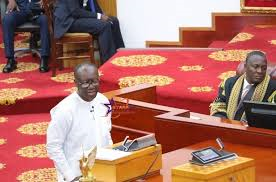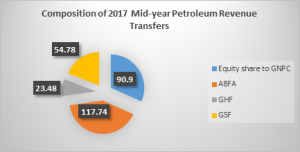Special topics

The petroleum sector in Ghana received $277.79 million from the export of crude oil in the first half of 2017. This was made known by the Finance Minister, Ken Ofori-Atta, during the presentation to the Parliament of Ghana, the Mid-Year Fiscal Policy Review of the 2017 budget statement and economic policy. The review was in accordance with fulfilment of section 28 of the Public Finance Management Act, 2016 (Act 921).
The total petroleum receipt, as announced by the Minister, is an achievement of 53% of the projected $515.57m for the fiscal year 2017. The attainment of this target is attributable to the coming on-stream of the TEN oil field project. The proceeds were cumulative from the 1st and 2nd lifting from the TEN field and 35th and 37th lifting from Jubilee fields respectively.
A breakdown of the receipts shows that royalties amounted to $67.68m, while Carried and Participating Interest amounted to $182.13. Other sources included corporate income tax, surface rentals and petroleum holding funds which accrued $27.34m, $0.49m and $0.17m respectively.
Of the total petroleum revenue received, $90.9 was transferred to Ghana National Petroleum Corporation (GNPC) as equity financing cost and net carried and participating interest. $117.74 m was transferred into the Annual Budget Funding Amount (ABFA), whilst $78.25m went into the Ghana Petroleum Funds, which consists of Ghana Heritage Fund ($23.48m) and Ghana Stabilization Fund ($54.78m).

In addition, he stressed on the passage of Customs and Excise (Petroleum Taxes and Petroleum Levies) (Repeal) Act, 2017 (Act 943) and the Energy Sector Levies (Amendment) Act, 2017 (Act 946) that saw the scrapping off some taxes that were deemed as a “nuisance”. According to the minister, this was done in fulfilment of the government’s promise to reduce untold hardship on the final consumer. The taxes reviewed include:
· Reduction in excise duties on petroleum products
· Reduction of special petroleum tax from 17.5 percent to 15 percent
· Review of the ESLA to reduce the cost of power and reduction in the National Electrification Scheme Levy from 5 percent to 3 percent, and the Public Lighting Levy from 5 percent to 2 percent
He ended with a resounding hope of ending the year by achieving all the targets that were set forth in the 2017 “Asɛmpa” budget which was read early this year, March 2.
The Jubilee Field is the first offshore project to produce oil in commercial quantities, whilst TEN came on-stream this year.